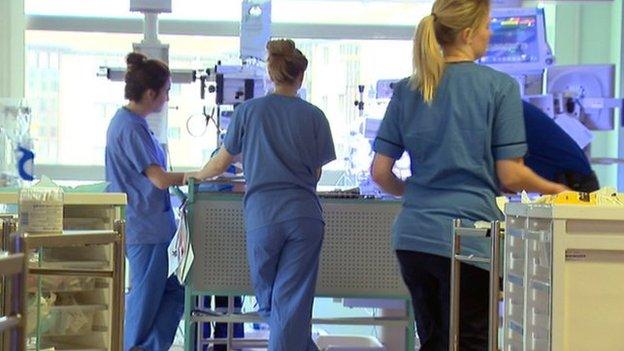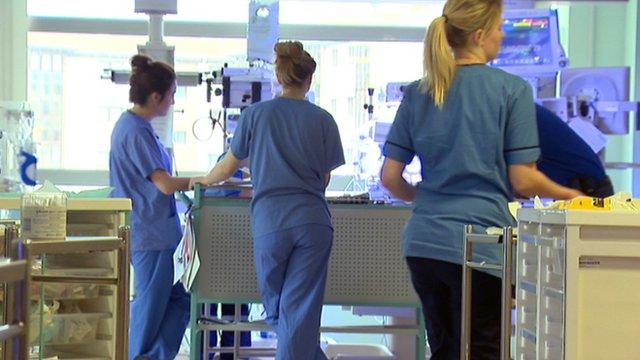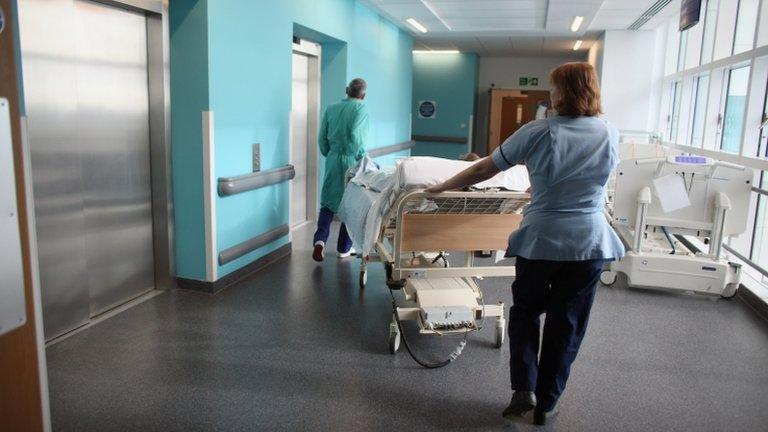NHS Scotland staff get 1% pay rise
- Published

Health workers in Scotland are to receive a 1% pay rise for the second year in a row.
Staff will see the extra money from 1 April.
Those earning less than £21,000 will also be given a top-up to ensure their salary rises by at least £300.
Health Secretary Shona Robison said the move would give NHS staff in Scotland "a better deal than their counterparts south of the border".
The amount was agreed after the Scottish government accepted recommendations put forward by the NHS Pay Review Body and Doctors' and Dentists' Pay Review Body (DDRB).
First Minister Nicola Sturgeon confirmed the decision during her weekly Holyrood question time.
'Better deal'
Ms Robison said: "Our hardworking and dedicated NHS Scotland staff will rightly receive the wage increases they were promised.
"While the independently recommend uplift is modest, it comes against the background of substantial cuts in Scotland's budget from Westminster, and will continue to give NHS staff in Scotland a better deal than their counterparts south of the border.
"As well as delivering the fully consolidated pay rise for NHS staff, and guaranteeing that all employees are paid at least the living wage, we are also committed to no compulsory redundancies for NHS Scotland staff."
Scotland was the only part of the UK to agree to the request for a pay rise for NHS staff last year.
This year's increase will mean that, from 1 April this year, the starting salary for a Band 5 nurse in Scotland will be £21,818, with the Scottish government stating this is in excess of £120 more than equivalent nurses in England and Wales.
For an experienced Band 5 nurse at the top of their pay scale, wages in Scotland will be increased to £28,462, which is £282 more than south of the border, according to the Scottish government.
'Unprecedented pressure'
Theresa Fyffe, the director of nursing body RCN Scotland, said: "We are committed to the independent NHS Pay Review Body, which recommended a 1% pay rise for all NHS staff, which the Scottish government has now accepted.
"This modest pay rise, however, comes at a time when staff are under unprecedented pressure and working flat out to cope with the increasing demand on services in our hospitals and out in the community.
"With health boards desperately trying to meet targets and balance their books, the pressures on staff are only set to increase."
Dr Peter Bennie, chair of the British Medical Association in Scotland, added: "It is welcomed that the Scottish government has allowed the DDRB to complete its independent process and has accepted the recommendations for hospital doctors; an entirely different approach to that of the Westminster government in order to deliver a fairer pay for NHS staff in Scotland.
"The cabinet secretary herself has acknowledged that these are 'modest' awards for doctors who have faced year on year real terms pay cuts.
"However, we do acknowledge this is a step towards recognising the commitment and hard work of staff in Scotland and to addressing the well-understood challenges of recruitment to and retention of medical posts."
The Scottish government has also accepted recommendations for NHS dentists which will mean they get a 1.61% increase in fees, which corresponds to a 1% rise in their net income.
This means patients who are not exempt from making a contribution towards their dental care will face some additional treatment costs.
Furthermore, ministers have accepted a recommendation to increase GP pay net of expenses by 1%.
Dr Bennie added: "It is disappointing that the DDRB has not considered the impact of the expenses associated with running a general practice, but we welcome the opportunity to discuss with government further funding to meet these rising costs."
- Published13 March 2014

- Published6 October 2013
